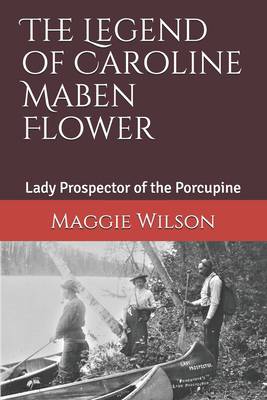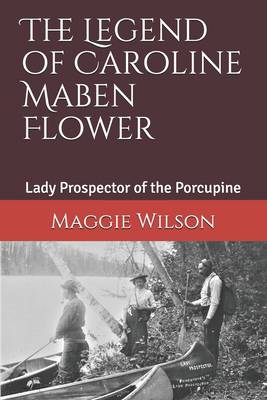
Je cadeautjes zeker op tijd in huis hebben voor de feestdagen? Kom langs in onze winkels en vind het perfecte geschenk!
- Afhalen na 1 uur in een winkel met voorraad
- Gratis thuislevering in België vanaf € 30
- Ruim aanbod met 7 miljoen producten
Je cadeautjes zeker op tijd in huis hebben voor de feestdagen? Kom langs in onze winkels en vind het perfecte geschenk!
- Afhalen na 1 uur in een winkel met voorraad
- Gratis thuislevering in België vanaf € 30
- Ruim aanbod met 7 miljoen producten
Zoeken
The Legend of Caroline Maben Flower
Lady Prospector of the Porcupine
Maggie Wilson
Paperback | Engels
€ 21,45
+ 42 punten
Omschrijving
Wherever you lived in 1906, when you read the newspapers, you found sensational reports about Cobalt, the silver mining boomtown in Northern Ontario. Everyone was talking about the spectacular mineral riches. People from around the globe descended on the frontier town to work, to invest, to take advantage of opportunity for a new life.
Caroline Maben Flower, a wealthy New York socialite, most certainly read the news. She came to Cobalt on doctor's orders to rest in the countryside. He suggested a fashionable resort in the Adirondacks. Why would she come to a dirty, noisy, frontier town instead?
To start over.
Born on a farm in the Midwest, Caroline took to the piano as a girl. With family support, she travelled to Berlin for additional musical training, aspiring to perform for the social elite in Manhattan.
Creative, perceptive, and fiercely independent, she modelled herself after the rising stars of the day and set out to achieve her goals with a single-minded determination.
Caroline conquered any barriers she encountered, whether it was poverty, chauvinism, or towering mountains.
Her relationships with men were passionate and tempestuous, neither traditional nor long-lasting. And therein was the challenge. Marriage solved several problems while creating many more.
She made mistakes, some driven by desperation, greed or impulsiveness. One terrible lapse was the turning point that led to an abrupt change in course, from Manhattan to the mining camps in Northern Ontario.
When she arrived in Cobalt, Caroline noted how the men made their fortunes at mining. She reckoned, if they could do it, so could she! Never one to let roadblocks stop her, she shouldered a pickaxe and set out to build a mine.
Just as she did with her music career, Caroline promoted herself and built a brand. In Cobalt, and later in the goldfields of the Porcupine, she traded on one notable asset: the fact that she was the only woman in the mining game.
This is her story, The Legend of Caroline Maben Flower, Lady Prospector of the Porcupine.
Caroline Maben Flower, a wealthy New York socialite, most certainly read the news. She came to Cobalt on doctor's orders to rest in the countryside. He suggested a fashionable resort in the Adirondacks. Why would she come to a dirty, noisy, frontier town instead?
To start over.
Born on a farm in the Midwest, Caroline took to the piano as a girl. With family support, she travelled to Berlin for additional musical training, aspiring to perform for the social elite in Manhattan.
Creative, perceptive, and fiercely independent, she modelled herself after the rising stars of the day and set out to achieve her goals with a single-minded determination.
Caroline conquered any barriers she encountered, whether it was poverty, chauvinism, or towering mountains.
Her relationships with men were passionate and tempestuous, neither traditional nor long-lasting. And therein was the challenge. Marriage solved several problems while creating many more.
She made mistakes, some driven by desperation, greed or impulsiveness. One terrible lapse was the turning point that led to an abrupt change in course, from Manhattan to the mining camps in Northern Ontario.
When she arrived in Cobalt, Caroline noted how the men made their fortunes at mining. She reckoned, if they could do it, so could she! Never one to let roadblocks stop her, she shouldered a pickaxe and set out to build a mine.
Just as she did with her music career, Caroline promoted herself and built a brand. In Cobalt, and later in the goldfields of the Porcupine, she traded on one notable asset: the fact that she was the only woman in the mining game.
This is her story, The Legend of Caroline Maben Flower, Lady Prospector of the Porcupine.
Specificaties
Betrokkenen
- Auteur(s):
- Uitgeverij:
Inhoud
- Aantal bladzijden:
- 208
- Taal:
- Engels
Eigenschappen
- Productcode (EAN):
- 9781777702809
- Verschijningsdatum:
- 16/07/2021
- Uitvoering:
- Paperback
- Formaat:
- Trade paperback (VS)
- Afmetingen:
- 152 mm x 229 mm
- Gewicht:
- 285 g

Alleen bij Standaard Boekhandel
+ 42 punten op je klantenkaart van Standaard Boekhandel
Beoordelingen
We publiceren alleen reviews die voldoen aan de voorwaarden voor reviews. Bekijk onze voorwaarden voor reviews.









